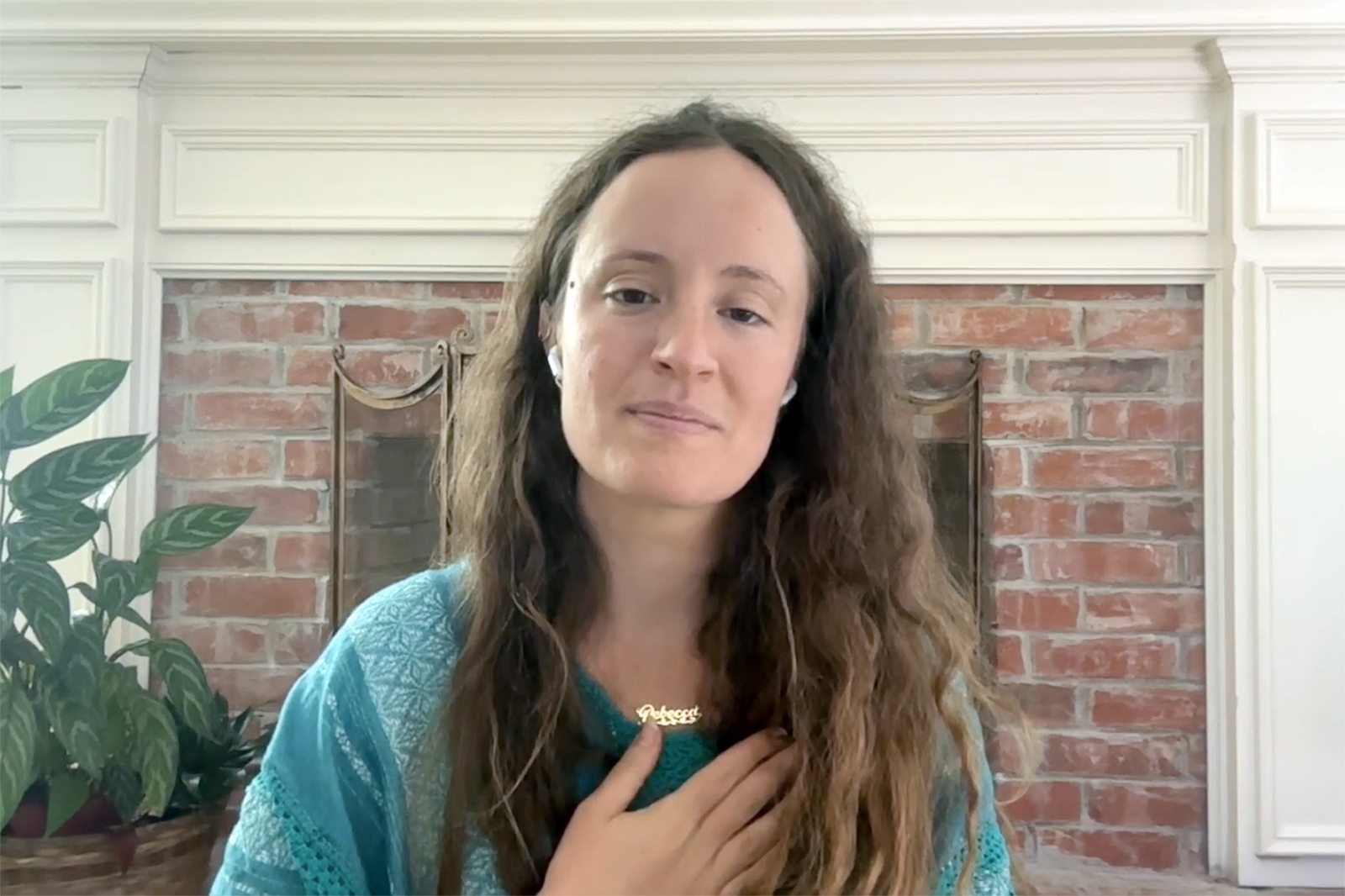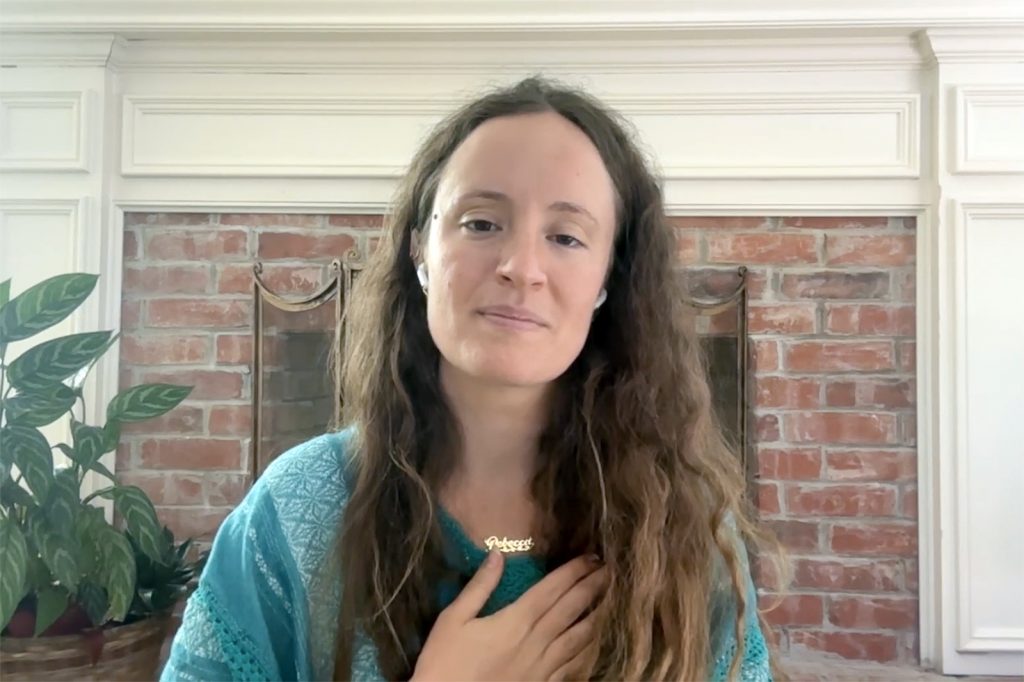
(RNS) — Elul, the current and final month in the ancient Hebrew calendar, is a time of introspection, preparation and forgiveness as Jews prepare for the High Holidays: first the new year celebration of Rosh Hashanah, followed by Yom Kippur, the day of repentance. In this time, Jews often blow the shofar, a trumpet fashioned from a ram’s horn, to end morning services and recite Psalm 27 (“The Lord is my light and my salvation; whom shall I fear?”) at morning and evening prayers.
But Cantor Lizzie Shammash, who leads online yoga classes from her Pennsylvania home for the Institute for Jewish Spirituality, an online community and think tank, believes that Elul’s introspection — and even shofar blasts — can be for anyone.
During the month of Elul, “you take account of your soul,” she said. “The shofar is a powerful spiritual alarm to wake us up, to develop our capacity to maintain an open heart and awaken from any spiritual slumber so we can live our most meaningful life.”
This month Shammash’s yoga classes are part of the Shofar Project, a program at the institute designed to inspire attendees to delve deeper into their spiritual practices during Elul. It offers weekly live sessions, readings and yoga practices that emphasize the tradition of self-reflection, all of them open to people of all backgrounds.
Founded 25 years ago as a way for rabbis to reconnect to their spirituality, the Institute for Jewish Spirituality counters the notion that the Jewish faith is a religion of dietary rules and traditions, instead treating it as a deeply spiritual practice that accommodates and even deepens mindfulness practices such as meditation and yoga. Over the past two decades, as these practices have been imported into mainstream society, largely through interest in Eastern faiths such as Hinduism and Buddhism, the institute and other organizations, such as Or HaLev, have emerged to offer resources for those seeking a mindfulness based on contemplative Jewish practices.
The Institute for Jewish Spirituality hosts daily meditations and teaches prayer, contemplative Torah study, yoga, singing and working with middot (character traits). In her classes, Shammash incorporates Torah text as well as readings from the “Zen Rabbi” Alan Lew. During Elul’s Shofar Project, she works from the week’s theme, whether opening the heart or hearing the pain of the world, for her yoga classes that draw around 100 attendees. “It’s about bringing spiritual themes into an embodied practice,” she said.
While open to all, Jewish spirituality programs have begun to attract Jews seeking new ways of connecting with their Jewish identity.
Dori Haber, a 37-year-old reading specialist in Manhattan, associates her childhood in Cleveland with her Jewish identity, from spending time in her reformed synagogue to Jewish summer camp, where there was no talk of Jewish spirituality.
But when she moved to New York City after college, she, like many young adults, found she didn’t have a religious place like a synagogue or camp to call home. “Joining a congregation felt expensive!” Haber told RNS. In Manhattan, a synagogue membership can cost several thousand dollars.
Instead, she found a free meditation class at the Jewish Community Center near her apartment and began to explore a strictly Buddhist approach to the practice at the Shambhala Meditation Center of New York.
But eventually, her meditation practice brought her back to Judaism. She attended a meditation retreat led by Jewish mindfulness teacher Rebecca Schisler, whom Haber had followed for a few years. “My practice started at the JCC, then went to Buddhism, and now has gone back (to Judaism) a little bit,” Haber told RNS. “They’re all connected. And it felt like a homecoming to know that these practices were actually rooted in Jewish practices.”
Haber said she has found a profound sense of belonging in organizations like the Institute for Jewish Spirituality, where Schisler leads young adults in weekly meditation sessions and annual silent retreats.
Rebecca Schisler in a recent video about preparing for the 2024 High Holidays. (Video screen grab)
This year, as many Jews reel from the Oct. 7 Hamas attack and its aftermath, Schisler’s classes seem to have offered some a refuge. She started the group, initially called “Holding Our Heartbreak,” after the violence broke out last year. When attendance surpassed her expectations, she started a virtual weekly meditation “sit” for young adults, offering a space where “no matter what their political orientation is, no matter who they are in their 20s and 30s, to just come together and be in a space that is welcoming and where we can dive into Jewish spirituality wisdom and practice together.”
During Elul, the group’s 140 mostly younger participants have been exploring the lunar Hebrew calendar’s “cyclical, rhythmic and earth based” nature. Schisler urges them to “return to their deepest intentions,” saying, “We miss the mark throughout the year, and we go astray from our intentions. Every year, we have this opportunity to return to our deepest intention.”
Schisler said she realized Judaism had a deeply innate spiritual tradition when she attended a Jewish meditation retreat in college. She lives by the Hebrew calendar, which she said brings different energies each lunar month, holidays throughout the year and a cycle of engaging in Torah study. “Depending on where we are in the calendar, we’re engaging with different themes, emotionally and spiritually, which can help us connect to the collective experience of other Jews and also people on the planet,” she said.
The core of Judaism’s mindfulness, said Schisler, is celebrating Shabbat, or Sabbath. “Shabbat is, in its essence, what mindfulness is all about,” she said.
While she draws from Buddhism and Judaism, Schisler said she is aware of the differences in goals and worldviews of the two traditions. For Buddhism, the peak of one’s spiritual development is enlightenment; in Judaism, she said, it’s prophecy.
But she sees no clash in using thought from both faiths. “In any tradition of ancient wisdom, there are aspects that are universal and aspects that are particular,” she said. “There can be beauty in exchange.”
Haber offers her own path as evidence, adding that, while mindfulness brought Haber back to Judaism, she has been “rethinking” how she grew up and what raising kids in a Jewish household means today.
“I’m going to raise my children Jewish, but it’s a rethinking of how I grew up. Now it seems less and less like congregations are the center of Jewish life.” Haber said. “It feels more like some of these other opportunities, like IJS or even the local JCC, can feel more accessible.”

